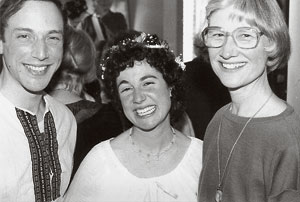
I love Toni Packer, though I haven’t seen her for twenty years. As a teacher, she is earthquakes, thunder, and the Northern Lights—or a still small voice. In her clarity of thought and subtlety of expression (the daughter of scientists) she evokes a sensation of profound intimacy.
After five years raging and thumping and squeezing and soldiering with her teacher and mine, Philip Kapleau, I got through the Mu koan during my first sesshin with Toni—make of that what you will. I must have been staring at her like an idiot in that little upstairs room at the Rochester Zen Center.
She said, “Do you understand?”
I said, “Understand what?”
She said, “What’s to understand?” and rang me out of there.
Later, in that same little room, when, with cues and nudges from Peter Kjolhede (now Bodhin Kjolhede, leader of the Rochester Zen Center), she handed me my rakusu—a ceremonial garb that was at that time reserved for us koan-kicking pros—she held it out to me, I clearly recall, between thumb and forefinger, at arm’s length, as if it were dirty toilet paper. The last thing Toni said, before—despite her warning—I went downstairs to preen in front of the non-cognoscenti, was to Bodhin: “Are we finished now?”
That discomfort with ceremony and status propelled her right out of the Rochester Zen Center manse and carriage house and Japanesque covered walkways and into an orbit all her own, and me with her—for a while. I learned to fly under Toni’s wing.
Once, typically, in our tumbledown zendo-in-exile, when a cerebral newbie was expostulating on the meaning of Zen, I whistled a robin’s call from some remote zafu, and Toni, picking it up at once, said: “Can you hear that birdsong? Can you?” shushing and waking him.
She still said “you” back in those days. It had not entirely devolved to “one.” Nowadays the second and first persons are, of course, anathema, like buboes on a flagellant. This was always, for me, Toni’s dark side—she could be bewitched by her own language. I was horrified once, years after our parting, when I heard her staff persons answering questions in a sort of assembly-line Toni-sprache.
It put me in mind of the title of a play that a friend of mine, Michael O’Donohue, wrote: “The Automation of Caprice.” Nobody I’ve encountered has a more luminous mind than Toni, but nobody and nothing escapes the force of inertia, the blind desire to repeat what once seemed spontaneous and good.
I remember the very first moment I saw that force acting on Toni. My then bride-to-be, Noelle Oxenhandler, and I were going over with Toni a passage in the Dhammapada that we wanted in the ceremony (ours was the first and last wedding she ever performed) when Toni uttered some denigratory remark about the book or the protocols surrounding it and then, perfunctorily, automatically, said, “But can one see through that?” and segued into some other matter.
It was a chink through which further light would flood—yes, light! Because to see the teacher as something other than fallibly human is dark, dark and destructive to all our souls. I still love Toni and Toni’s dharma, which illumines me constantly, bumps and divots despite. She helped teach me how to open, without prejudice, these eyes that eventually came to see in her, as in all of us, the dark and the light together—an incomparable gift.
Thank you for subscribing to Tricycle! As a nonprofit, we depend on readers like you to keep Buddhist teachings and practices widely available.